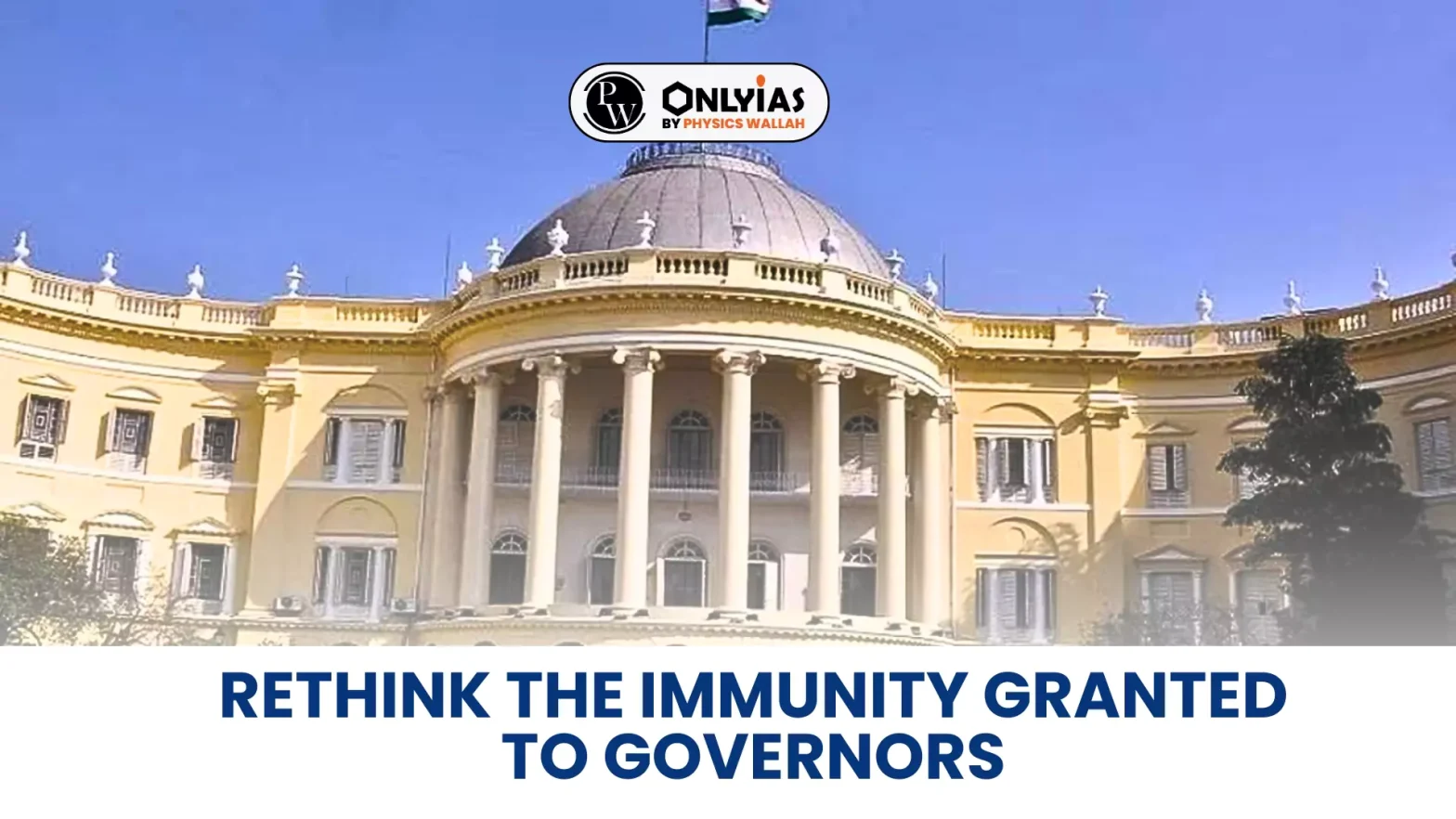Serious allegations of sexual harassment and molestation have been levelled against the governor of West Bengal. Such allegations are substantive for the criminal justice to start against an accused under India’s criminal jurisprudence.
Immunity Granted to Governors
When an accused enjoys constitutional or statutory powers, as in the present case, it is very rare that an individual or woman would come in public to lodge a complaint.
Enroll now for UPSC Online Course
- Here, the accused holds a constitutional position and enjoys immunity as set out in Article 361 of the Constitution, especially in Clause 2 which states that “no criminal proceedings of whatsoever shall be initiated or continued against the governor“.
- This widely worded provision of immunity can be attributed to our colonial past which functioned with the concept of the “king can do no wrong“.
- This concept was reflected in independent India’s Constitution.
- Even in England, the Crown Proceedings Act – passed in 1947 – made it possible to sue the Crown for civil wrongs, while retaining several privileges and immunities.
- Under India’s constitutional mechanism, the governor’s immunity is very wide.
- One consequence of this is that the bar under Article 361(2) is set even when there are allegations of crime against women and corruption.
- In 2015, there were allegations of corruption against the then-governor of Madhya Pradesh, but legal processes could not be initiated because of his position.
- Similarly, in 2017, then Meghalaya governor faced allegations of serious moral turpitude involving several women survivors.
- It is not that Constitution makers while articulating the provision under Article 361 (2), were unaware of the possible misuse of this provision. The Constituent Assembly debates reflect that; on September 8, 1949, HV Kamath questioned if the governor or the ruler shall have “no liability for the criminal act committed by him during his term of office.“
- He asked, “Suppose for instance he commits a crime, God forbid that the President or the governor or the ruler of a State should be guilty of criminal conduct but human nature is fallible and so if he unfortunately commits a criminal act, does this clause mean that no proceeding can be instituted against him during the whole prescribed term?”
- In the case of Rameshwar Prasad (2005), while interpreting the immunity of the governor under Article 361(1) with regard to action in the discharge of official duties, the Supreme Court (SC) held that the mala fide actions of the governors shall be amenable to court proceedings.
- The SC clarified that due to the immunity, a governor cannot be sued, but that does not mean that the ground of mala fides or a proclamation without any basis in law would not be examined in court.
- It further said such allegations against a governor were required to be defended by the State, given the bar in Article 361(1) meant the governor can not be present in Court.
- We have seen many governors resign after allegations against them were reported in the public domain, but there are also many who didn’t.
- This depends on the political scenario at the time and the will of the central executive. Both these factors function arbitrarily and without accountability.
- There have been some changes, though, in England, ushered in by legislation.
- We have also seen President Bill Clinton facing trial as per the mechanism of the United States Constitution, in the Monica Lewinsky matter.
Article 361 in Constitution of India
Article 361; Protection of President and Governors and Rajpramukhs
- The President, or the Governor or Rajpramukh of a State, shall not be answerable to any court for the exercise and performance of the powers and duties of his office or for any act done or purporting to be done by him in the exercise and performance of those powers and duties:
- Provided that the conduct of the President may be brought under review by any court, tribunal or body appointed or designated by either House of Parliament for the investigation of a charge under article 61:
- Provided further that nothing in this clause shall be construed as restricting the right of any person to bring appropriate proceedings against the Government of India or the Government of a State.
- No criminal proceedings whatsoever shall be instituted or continued against the President, or the Governor of a State, in any court during his term of office.
- No process for the arrest or imprisonment of the President, or the Governor of a State, shall issue from any court during his term of office.
- No civil proceedings in which relief is claimed against the President, or the Governor of a State, shall be instituted during his term of office in any court in respect of any act done or purporting to be done by him in his personal capacity, whether before or after he entered upon his office as President, or as Governor of such State, until the expiration of two months next after notice in writing has been delivered to the President or the Governor, as the case may be, or left at his office stating the nature of the proceedings, the cause of action therefor, the name, description and place of residence of the party by whom such proceedings are to be instituted and the relief which he claims.
Enroll now for UPSC Online Classes
Conclusion
The broad immunity granted to governors under Article 361 hampers accountability, necessitating reforms to address allegations of criminal conduct, especially against women and corruption.
![]() 31 May 2024
31 May 2024
